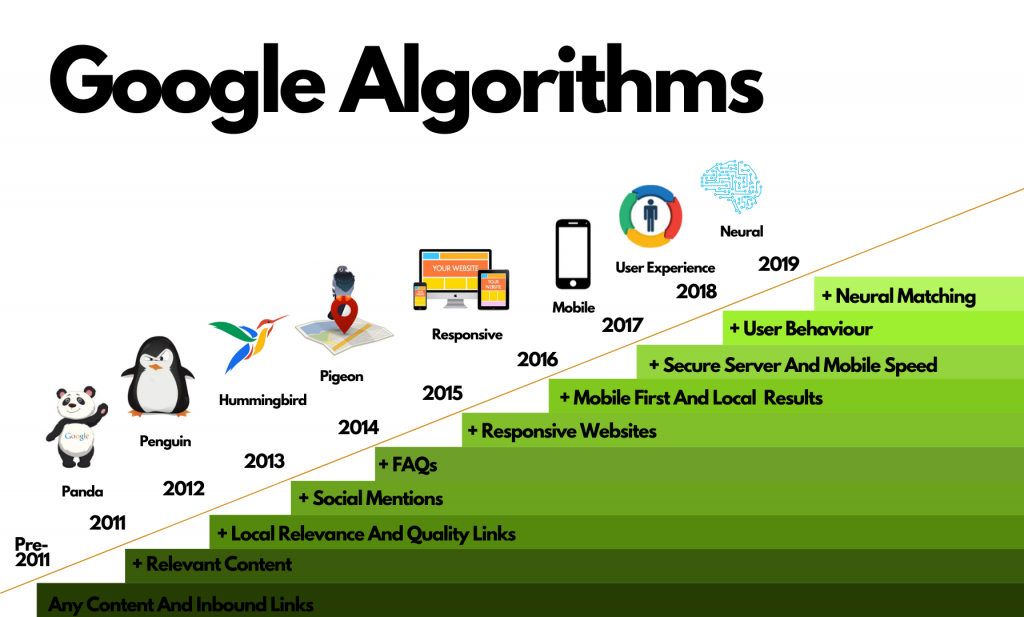Understanding Google’s Search Algorithm: How to Stay Ahead of Update
I. Introduction
The world of search engine optimization (SEO) is constantly evolving, and at the center of it all is Google’s search algorithm. Understanding how this algorithm works and staying ahead of updates is essential for anyone looking to drive traffic to their website through organic search.
In the early days of Google, search engine optimization was largely focused on tricking the algorithm through tactics such as keyword stuffing, link schemes, and other black hat techniques. However, over the years, Google has become much more sophisticated, and these tactics are no longer effective. In fact, they can even harm your website’s ranking in search results.
Today, successful SEO requires a deep understanding of Google’s search algorithm and the factors it takes into account when ranking websites. These factors include everything from the relevance and quality of your website’s content to the authority and trustworthiness of the domains linking to your site.
One of the biggest challenges in SEO is staying ahead of the frequent updates to Google’s search algorithm. These updates are designed to improve the relevance and accuracy of search results and often have a significant impact on the ranking of websites. For example, the 2018 “Medic” update focused on improving the accuracy of health-related search results, while the 2020 “May Core Update” aimed to improve the relevance and diversity of search results.
Staying ahead of these updates requires constant monitoring of industry news and trends, as well as a willingness to adapt your SEO strategy as needed. However, the benefits of doing so can be significant. By staying ahead of updates, you can ensure that your website remains competitive in search results and continues to drive traffic and conversions.
In this blog post, we’ll dive into the ins and outs of Google’s search algorithm, explore the different types of updates that are released, and provide tips and strategies for staying ahead of the curve. Whether you’re new to SEO or a seasoned pro, understanding Google’s search algorithm is critical to your success in driving organic search traffic.
II. What is Google's Search Algorithm?
Google’s search algorithm is a complex set of rules and processes that determine how websites are ranked in search engine results pages (SERPs). The algorithm considers a wide range of factors to determine which websites are most relevant and useful to a particular search query.
The algorithm is constantly evolving, with Google making hundreds of updates each year to improve the relevance and accuracy of its search results. These updates can range from small tweaks to the way the algorithm processes certain signals, to major updates that can have a significant impact on the ranking of websites.
At its core, Google’s search algorithm is designed to return the most relevant and useful results for a particular search query. To do this, the algorithm considers a wide range of factors, including the content on a website, the links pointing to that website, the user’s location and search history, and the device they’re using to perform the search.
One of the most important factors in Google’s algorithm is the relevance and quality of a website’s content. Websites that have high-quality, useful content that is relevant to the search query are more likely to rank well in search results. This is why content marketing has become such an important part of SEO in recent years.
Another important factor in the algorithm is the authority and trustworthiness of a website. Google considers factors such as the number and quality of external links pointing to a website, as well as the authority and trustworthiness of the domains linking to that site. Websites that have a high level of authority and trustworthiness are more likely to rank well in search results.
In addition to these factors, Google’s algorithm also considers a wide range of technical factors, such as the speed and mobile-friendliness of a website, as well as the way that a website is structured and coded.
Overall, Google’s search algorithm is a complex and ever-evolving system that takes into account a wide range of factors to determine the ranking of websites in search results. By understanding these factors and keeping up-to-date with the latest updates to the algorithm, website owners can optimize their sites for search and drive more organic traffic to their site.
III. Understanding Google's Search Algorithm Updates

Google’s search algorithm is constantly evolving, with hundreds of updates being made each year to improve the accuracy and relevance of search results. These updates can range from minor tweaks to the way the algorithm processes certain signals, to major updates that can have a significant impact on the ranking of websites.
To stay ahead of the curve in SEO, it’s important to understand the different types of updates that Google makes to its search algorithm. Here are some of the most common types of updates:
1. Core Updates
These updates are typically the most significant, and can have a major impact on the ranking of websites in search results. Core updates are designed to improve the relevance and accuracy of search results, and can affect a wide range of search queries and types of content.
2. Panda Update
Panda updates are designed to target low-quality content, such as thin content, duplicate content, and content that is irrelevant or of poor quality. These updates aim to ensure that high-quality content is rewarded in search results.
3. Penguin Updates
Penguin updates are designed to target spammy link building practices, such as buying links or using link networks to manipulate search rankings. These updates aim to ensure that the links pointing to a website are natural and high-quality.
4. Mobile Updates
Mobile updates are designed to improve the mobile-friendliness of websites, as more and more users are accessing the internet through mobile devices. Websites that are not mobile-friendly may be penalized in search results, while mobile-friendly sites may see a boost in rankings.
5. Local Updates
Local updates are designed to improve the accuracy and relevance of local search results. These updates take into account factors such as the user’s location and search history, as well as the accuracy and consistency of local business information.
Staying ahead of these updates requires a deep understanding of the factors that are taken into account in Google’s search algorithm, as well as a willingness to adapt your SEO strategy as needed. By monitoring industry news and trends and keeping up-to-date with the latest updates, website owners can ensure that their sites remain competitive in search results and continue to drive traffic and conversions.
IV. How to Stay Ahead of Google's Search Algorithm Updates

Staying ahead of Google’s search algorithm updates is essential for any website owner who wants to maintain or improve their search engine rankings. Here are some tips to help you stay ahead of the curve:
Keep Up-to-Date with Industry News
One of the best ways to stay ahead of algorithm updates is to stay informed about the latest news and trends in the SEO industry. Subscribe to industry blogs, follow SEO experts on social media, and attend industry conferences and events to stay up-to-date on the latest updates and best practices.
Focus on High-Quality Content
Creating high-quality, relevant content that provides value to your target audience is essential for maintaining or improving your search engine rankings. Avoid keyword stuffing or other black hat SEO tactics that can result in penalties or lower rankings.
Build Natural and High-Quality Links
Building natural, high-quality links to your website is essential for improving your search engine rankings. Focus on creating valuable content that other websites will want to link to, and avoid using manipulative link building tactics that can result in penalties.
Optimize for User Experience
Providing a great user experience on your website is important for both user engagement and search engine rankings. Optimize your website for speed, mobile-friendliness, and ease of use, and focus on creating a positive user experience that encourages visitors to stay on your site.
Monitor Your Rankings and Traffic
Regularly monitoring your search engine rankings and organic traffic can help you stay ahead of algorithm updates and make adjustments to your SEO strategy as needed. Use tools like Google Analytics and Google Search Console to track your website’s performance and identify any changes or trends.
By following these tips and staying up-to-date on the latest trends and updates in the SEO industry, website owners can stay ahead of Google’s search algorithm updates and maintain or improve their search engine rankings over time.
V. Conclusion
Google’s search algorithm is constantly evolving, making it essential for website owners and SEO professionals to stay up-to-date on the latest updates and best practices. By understanding how Google’s search algorithm works and keeping up-to-date with the latest trends and updates in the SEO industry, website owners can maintain or improve their search engine rankings and drive more organic traffic to their site.
To stay ahead of Google’s search algorithm updates, it’s important to focus on creating high-quality, relevant content that provides value to your target audience. Building natural, high-quality links to your website, optimizing for user experience, and monitoring your search engine rankings and traffic can also help you stay ahead of the curve.
While staying ahead of Google’s search algorithm updates can be challenging, it’s an essential part of any successful SEO strategy. By being proactive and staying informed about the latest updates and best practices, website owners can ensure that their site remains competitive in search results and continues to drive traffic and conversions over time.
In conclusion, the key to staying ahead of Google’s search algorithm updates is to stay informed, be proactive, and focus on creating high-quality content that provides value to your target audience. By following these tips and adapting your SEO strategy as needed, you can maintain or improve your search engine rankings and drive more organic traffic to your site, leading to greater success online.











Write a Comment